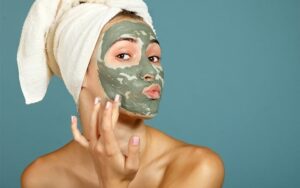Table of Contents
Kaolin Clay: A Gentle Natural Remedy for Skin and Health
For those seeking a mild, versatile clay to incorporate into their skincare or health routine, kaolin clay offers a natural alternative. Unlike stronger clays like bentonite, kaolin is gentler and ideal for sensitive skin types, making it a popular choice in beauty, health, and even industrial applications.
What is Kaolin Clay?
Kaolin clay, also known as “China clay” or “white clay,” is primarily composed of the mineral kaolinite. It is naturally found in soils worldwide, especially in China, the U.S., and Brazil, and typically appears in a soft, white, or pinkish hue. With a rich mineral composition, kaolin contains silica, quartz, and small amounts of beneficial minerals like copper, magnesium, and zinc.

Kaolin Clay: A Gentle Natural Remedy for Skin and Health
History and Origin of Kaolin Clay
Kaolin clay derives its name from “Kao-ling,” a hill in China where it was first mined. Its popularity has since spread globally due to its myriad of uses—from skincare and health to ceramics and industrial products.
Kaolin Clay Varieties and Their Uses
Kaolin comes in several colors, each with unique properties that make them suitable for various skin concerns. The three main types include:
- White Kaolin Clay: The gentlest form, ideal for sensitive skin and general use.
- Red Kaolin Clay: Contains higher iron oxide levels, making it suitable for those aiming to reduce signs of aging.
- Green Kaolin Clay: Best for oily and acne-prone skin due to its higher drying effect.
Benefits of Kaolin Clay
1. Mild and Non-Irritating for Sensitive Skin
Unlike other clays, kaolin is extremely gentle, making it a safe option for almost all skin types, including sensitive skin. It is commonly used in face masks and exfoliants that help cleanse and brighten the skin without causing irritation. Studies have shown that kaolin’s pH is close to that of human skin, making it a natural choice for mild cleansing and detoxification.
2. Natural Acne and Inflammation Management
With antibacterial properties, kaolin clay can reduce acne-causing bacteria, minimize breakouts, and soothe inflamed skin. Its ability to absorb excess oil and unclog pores makes it especially helpful for oily and acne-prone skin. Kaolin’s gentle exfoliation also prevents irritation, allowing for a balanced, clear complexion.
3. Supports Skin Elasticity and Reduces Signs of Aging
Kaolin clay may enhance skin firmness and elasticity by removing dead skin cells and promoting a smoother texture. Its iron oxide content, especially in red kaolin clay, contributes to toning and skin softening. With regular use, it can help reduce fine lines, dark spots, and other age-related skin concerns, offering a natural approach to anti-aging.
4. Potential Aid for Digestive Health
Kaolin pectin, a liquid form of kaolin combined with pectin fiber, has been used to relieve gastrointestinal issues such as diarrhea and stomach ulcers. This formulation absorbs toxins and harmful bacteria, alleviating symptoms in digestive discomfort. Although generally safe, consulting a healthcare provider before using kaolin internally is advised.
5. Assists in Blood Clotting
Kaolin’s use extends into emergency medicine, where it helps with blood clotting and wound treatment. Military organizations like the Naval Medical Research Institute utilize kaolin-infused gauze to control bleeding and accelerate healing in injuries. This underscores kaolin’s safety and utility beyond skincare.
How to Use Kaolin Clay in Daily Routines
Kaolin clay is available in dry or powdered forms, allowing you to make personalized skincare or health products at home. Here are some popular ways to incorporate kaolin clay into your routine:
DIY Skin and Hair Care
- Face Mask: Mix a small amount of kaolin clay with water to create a paste. Apply to damp skin, leave on for 5-10 minutes, then rinse with warm water.
- Hair Cleanser: Apply a kaolin paste to the scalp and roots, let it sit for 5 minutes, and rinse thoroughly.
- Bath Soak: Add kaolin and Epsom salts to a warm bath for relaxation and skin care.
Oral Care
Kaolin can be added to toothpaste to aid in gum cleansing and teeth whitening. Avoid swallowing kaolin and rinse well afterward for optimal results.
Kaolin Clay vs. Bentonite Clay
Though both kaolin and bentonite clays are used in skincare, they differ in composition and properties:
- Kaolin Clay: Has a neutral pH and is milder, making it suitable for sensitive or dry skin.
- Bentonite Clay: Has a higher pH and absorbs more water, making it more effective for oily skin types but potentially drying for sensitive skin.
Safety and Precautions
While kaolin clay is safe for most people, certain precautions should be taken:
- Avoid inhaling kaolin powder, as prolonged exposure can irritate respiratory passages.
- Refrain from using kaolin on open wounds or sensitive skin areas.
- Consult a healthcare provider before internal use, especially if taking other medications.
Conclusion
Kaolin clay is a versatile, natural remedy suitable for skin, hair, oral, and even digestive care. Its mild nature makes it a fantastic option for sensitive skin and those looking for natural treatments for acne, inflammation, and signs of aging. By adding kaolin to your routine, you can benefit from its detoxifying and soothing properties without the risk of irritation common with other clays.